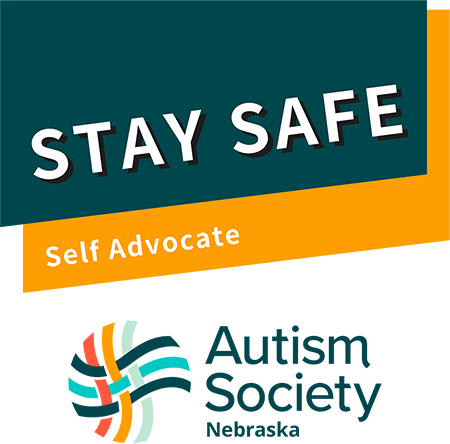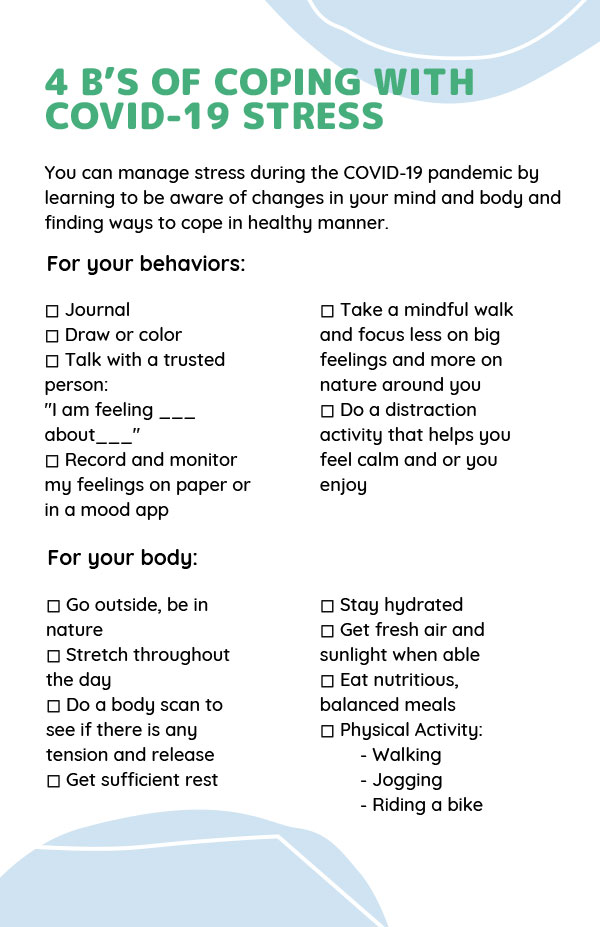Learning to cope with stress during COVID-19 is an important skill to have and develop during this pandemic. It also helps you to maintain a good balance and stay on track to meet daily life responsibilities and goals. Once you have completed your stress self-check (see skill “How to become more self-aware of your stress signals”), now you can work on the skill of how to cope with them.
Coping with stress is a life skill that also helps to deal with negative and positive stressors that are a part of life. During COVID-19, you can choose different activities to help you cope with your stress.
The following questions can help you identify where you need the most support and skills to cope.
- What things can I do to help my brain?
- What things can I do to help my body?
- What things can I do to help my behaviors?
- What things can I do to help my big feelings?
Review
Strategies for Coping with COVID-19 Stress
4 B’s of Coping with Stress
To review, download or print – click HERE
Practice
Once you have reviewed the 4-B’s handout, it’s time to practice! You might find a way to write down the activities you have chosen for your brain, big feelings, body and behaviors to remind yourself to do them. Consider writing reminders on “sticky notes” or mark them in your daily calendar. What is most important is that you remember each day to keep practicing these strategies to help keep your levels of stress to a minimum!
Reflection
Questions that can help you evaluate your practice. Examples:
- Did I use the 4-B’s handout to choose activities to reduce my stress?
- Did I find a way to remind myself to practice these activities when I feel stressed?
- Did these activities help to reduce my stress?
- If yes, continue to practice these strategies on an as needed basis.
- If no, this is a good time to talk to a trusted person to find more resources to help you cope with your stress.
If you are feeling like the coping skills are not working and your emotions are too overwhelming, please reach out to a trusted person, or contact your local or national crisis line phone number or text number.
Below are a few numbers to contact, if you would like more information for crisis line numbers in your area. Please dial 211.
Nebraska Crisis Line Phone/Text Numbers
Behavioral Health Services Crisis Line
Provides immediate mental health crisis counseling services to those in need.
24/7 Crisis Line: (402) 717-4673
Center Pointe
24/7 Crisis Line: (402) 475-6695
Crisis Text Line
Text TWLOHA to 741-741
A trained crisis counselor receives the text and responds quickly.
National Crisis Line Numbers
Crisis Call Center
(800) 273-8255
Call the Crisis Call Center or text CARE to 839863 for 24/7/365 crisis support. The purpose of the Crisis Call Center is to provide a safe source of support for individuals in any type of crisis.
National Suicide Hotline:
(800) 273-8255 (800-SUICIDE)
(800) 273-8255 (800-273-TALK)
Warm Lines
Warm lines are an alternative to crisis lines if you’re not in an immediate crisis but still want to talk to someone and receive emotional support. They’re usually free and confidential and are staffed by peers who have dealt with mental health issues themselves. Most warm lines were designed to be state-specific or local, though some accept out-of-state calls and cover a national service area.
Keya House Warmline
(402) 261-5959
Available 24/7
Safe Harbor
(402) 715-4226
Available 24/7

